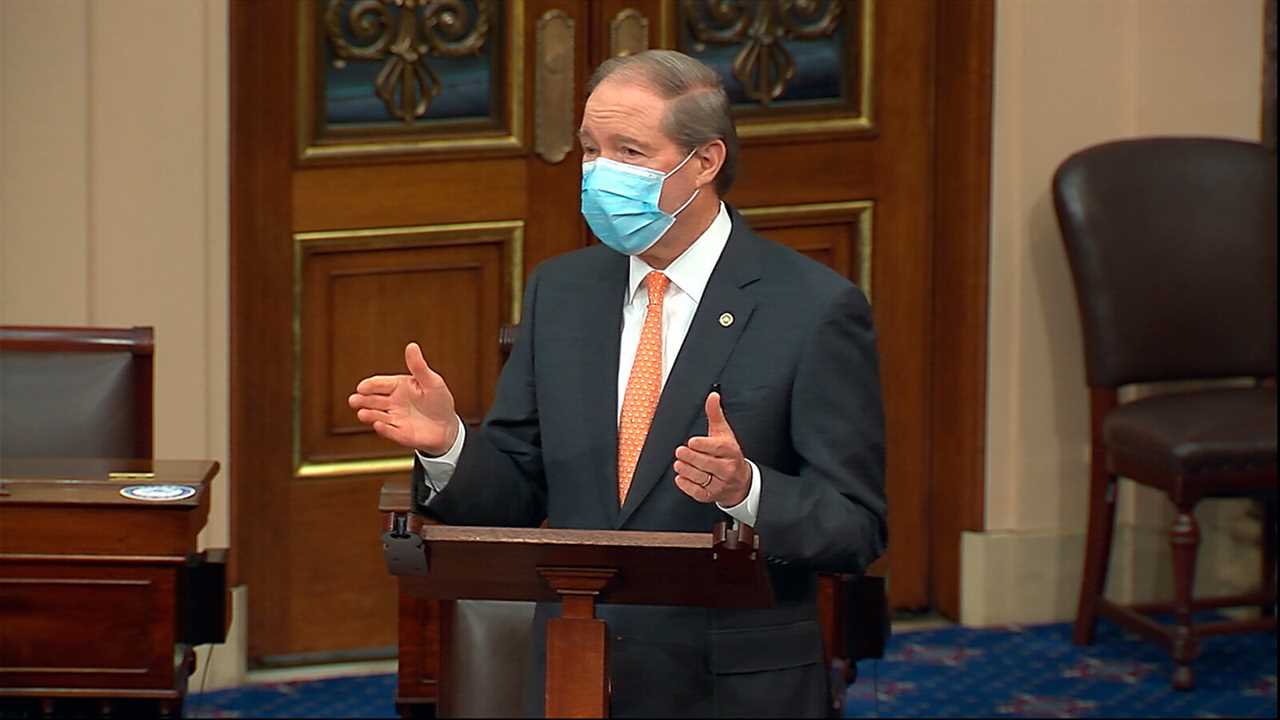
WASHINGTON — Senator Tom Udall urged his colleagues on Tuesday to kill the legislative filibuster that he said had helped turn the Senate into a “graveyard for progress,” using his farewell speech to point up a state of dysfunction in Congress that had become painfully obvious to most everyone listening to him.
“I’m not the first to say this in a farewell address, and I won’t be the last, but the Senate is broken,” Mr. Udall, Democrat of New Mexico, said on Tuesday in what is likely his final speech after 12 years in the deeply divided institution.
“The Senate is broken,” he repeated for emphasis.
For months, Americans have watched in anger as Congress remained mired in partisan paralysis over more pandemic relief, allowing unemployment benefits to lapse as many suffer from joblessness. Fewer people approve of the job lawmakers are doing in Washington than at almost any time in recent history. And the government watchdog group Common Cause ranked the current Congress the “least productive in history,” noting that only about 1 percent of bills introduced became law.
Mr. Udall emphasized this dysfunctional state of affairs on the floor, calling on senators to gut the legislative filibuster — which effectively requires a 60-vote supermajority to advance any major legislation — and change a culture he said valued partisanship over the country’s best interests.
Mr. Udall was the second senator in two weeks to use his farewell speech to express disgust at the current state of the chamber under the leadership of Senator Mitch McConnell of Kentucky, the majority leader, and his Democratic counterpart, Senator Chuck Schumer of New York. The pair often use the better part of their speeches at the beginning of floor sessions taking jabs at other, while few bipartisan deals are struck.
Mr. McConnell’s friend Senator Lamar Alexander, Republican of Tennessee, who is retiring after 18 years, described the Senate last week as “like joining the Grand Ole Opry and not being able to sing.”
“It’s a real waste of talent,” Mr. Alexander said.
In recent months, Congress has failed to pass an infrastructure package, notwithstanding the widespread support for such a plan, or unite around proposals for police changes, despite bills offered by both parties with a nation gripped by unrest after police killings of unarmed Black Americans. The logjam over a new stimulus package — with negotiators intent on playing hardball rather than compromise — has been a constant source of frustration.
In recent weeks, a bipartisan group of senators has tried to change the dynamic and create a new more centrist power center in Washington, putting forward a compromise stimulus plan to try to break the impasse. And there were glimmers of momentum on Tuesday after months of stalemate as lawmakers and the White House redoubled efforts to get something done before the holidays.
But the general lack of legislating has raised serious questions about whether Congress can still function, and whether President-elect Joseph R. Biden Jr. will be able to enact any of his policy agenda.
Mr. Udall, a former New Mexico attorney general and a member of a storied political family from the West, said he laid much of the blame for the state of the Senate on the filibuster, while others, like Mr. Alexander, argue that it is merely the culture of the place that needs to change, not the rules.
In an interview with The New York Times last week, Mr. Udall detailed why he saw the 60-vote threshold as an impediment to coming up with answers for the existential problems of the moment, such as climate change.
“The filibuster came to be through historical accident,” he said on the Senate floor Tuesday. “The reality of the filibuster is paralysis — a deep paralysis.”
Proponents of eliminating the filibuster have proposed changing Senate rules so legislation could be muscled through with a simple majority vote of 51. Should Democrats win both of the two Senate seats up for grabs in January runoff elections in Georgia — thereby winning control of the chamber — ending the legislative filibuster would allow Mr. Biden to circumvent Republican opposition and push through his policy priorities.
Under current rules, the majority leader unilaterally chooses which measures advance to the floor for a vote, a process that has resulted in the confirmation of more than 200 conservative judges nominated by President Trump while more than 400 bills, including many progressive proposals from the House, languish.
Mr. Udall also lamented the state of American politics, calling the country’s campaign finance system “out of control.”
“Secret money floods campaigns to buy influence, instead of letting the voters speak,” he said. “Voting rights are under attack. We can do our best to be good people in a system like that, but it’s no surprise that America’s faith in government is declining. These structures are anti-democratic. They reward extremism. They punish compromise.”
After Mr. Udall was finished speaking, Senator Jeff Merkley, Democrat of Oregon, said the Senate would be wise to listen to his advice. Mr. Merkley, like Mr. Udall, said he favored keeping a “talking filibuster” in which a senator can slow down legislation he or she opposes, but must do so by actually continuing to talk on the floor.
Mr. Udall “cares about the function of this body and has shared with us idea after idea about how we might make it work better — ideas we should still work to consider in the months and years ahead,” Mr. Merkley said.
Not long after Mr. Udall finished his remarks, Mr. McConnell and Mr. Schumer lashed out at each other over the stimulus talks. Mr. McConnell called Democrats “a wholly owned subsidiary of the plaintiff’s bar,” while Mr. Schumer accused Mr. McConnell of “sabotaging good-faith, bipartisan negotiations.”
Without a deal, unemployment benefits for freelance workers and the long-term unemployed and protections against evictions are set to expire after Christmas.
Did you miss our previous article...
https://trendinginthenews.com/usa-politics/bidens-choice-for-pentagon-faces-questions-on-ties-to-contractors






